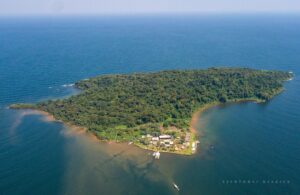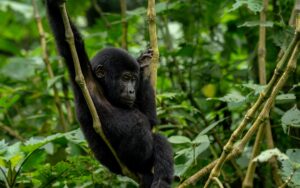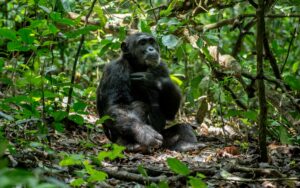The Ministry of Tourism-Uganda recently announced Juliana Kagwa as the new Chief Executive Officer of the Uganda Tourism Board (UTB), marking a significant leadership transition for a sector that contributes 7.7% to the East Africa nation’s GDP.
Juliana Kagwa’s appointment as the new Chief Executive Officer of the Uganda Tourism Board (UTB), replacing Lilly Ajarova, who led the organization since 2019 and focused on conservation and tourism marketing, notably at Ngamba Island Chimpanzee Sanctuary.
The appointment, confirmed on May 21st, 2025, follows a contentious recruitment process criticized for lacking transparency, yet Kagwa’s leadership is expected to boost Uganda’s global tourism competitiveness through new international campaigns, according to a senior tourism official cited by ChimpReports.

Juliana Kagwa, a corporate veteran with over two decades of experience in strategic marketing at Uganda Breweries Limited, replaces Lilly Ajarova, whose conservation-driven tenure elevated Uganda’s global tourism profile.
As the world grapples with climate change and over-tourism, stakeholders are eager to see if Kagwa can steer Uganda toward a sustainable future, balancing economic growth with the preservation of the country’s pristine landscapes and vibrant communities.
Kagwa’s appointment, confirmed on 21st May, 2025 via an X post by the Ministry of Tourism-Uganda, has sparked widespread congratulations from tourism stakeholders, including Miss Tourism Uganda , who expressed enthusiasm about working with her, and Ministry of Tourism Tooro Kingdom , representing the cultural institution Obukama Bwa Tooro Kingdom in Western Region.
However, her selection follows a contentious recruitment process criticized for lacking transparency, as reported by ChimpReports earlier today. Despite this, Kagwa’s supporters highlight her credentials, a Master’s in Business Administration and a proven track record in branding—as key to elevating Uganda’s tourism competitiveness on the global stage.

Kagwa inherits a legacy shaped by Ajarova, who earned the nickname “Mama Chimp” for her work with chimpanzee sanctuaries like Ngamba Island and championed conservation through initiatives like camping trails in the Rwenzori Mountains.
Ajarova’s focus on sustainable infrastructure set a foundation, but Kagwa’s corporate background signals a potential shift toward marketing-driven growth.
“Juliana brings a wealth of experience in stakeholder management and corporate strategy,” a senior tourism official told ChimpReports. “We are optimistic she will position Uganda as a leader in sustainable tourism.”

Uganda’s tourism sector is a cornerstone of its economy, contributing $55.2 per quarter to GDP per capita, outpacing gross domestic savings ($46.1) and imports ($50.1). Yet, this growth comes with risks.
The African Leadership Magazine (2024) warns that over-tourism, poaching, and habitat destruction have led to a 60% loss of Africa’s wildlife over the past 50 years, threatening iconic attractions like Uganda’s gorilla trekking in Bwindi Impenetrable National Park.
Climate change further endangers ecosystems, with melting glaciers in the Rwenzori Mountains, a UNESCO World Heritage site, altering the region’s biodiversity.
The COVID-19 pandemic exposed the sector’s vulnerabilities, slashing international tourist arrivals from 1,542,620 in 2019 to 473,296 in 2020 and costing Uganda $1.01 billion in foreign exchange earnings. While domestic tourism has rebounded, global trends indicate a decline in international visitor spending, with the U.S. alone projected to lose $12.5 billion in 2025 (wttc.org).

For Kagwa, the challenge is clear, how can Uganda attract eco-conscious travelers while protecting its natural and cultural heritage?
Kagwa’s corporate expertise could be a game-changer for sustainable tourism. Her experience in branding might help launch global campaigns that highlight Uganda’s eco-friendly initiatives, such as carbon-neutral safari lodges or community-led conservation programs.
The Future Business Journal (2025) notes that African countries like South Africa have successfully used social media to promote sustainable tourism. Kagwa could adopt similar strategies to showcase Uganda’s attractions, from the misty forests of Kibale National Park near Fort Portal City to the rugged peaks of Mount Elgon in Uganda Eastern Region.
Infrastructure development is another opportunity. The African Development Bank emphasizes tourism’s role in driving transportation and telecommunications growth. Kagwa could prioritize improving access to remote areas like the Rwenzori Mountains Ranges in Rwenzururu Kingdom, where tour guides recently highlighted limited network access and security concerns.

Digitalizing data collection, as recommended by Hotel Links Solutions, could also help monitor tourism’s environmental impact and ensure sustainable growth.
Community empowerment is equally critical.
Sustainable tourism initiatives provide livelihoods for over 10 million local residents in ecotourism-rich areas globally, according to the United Nations World Tourism Organization (UNWTO). In Uganda, investing in training locals for tourism roles such as guides or lodge managers could prevent the expatriation of earnings and ensure communities benefit directly.
Challenges on the Horizon
Kagwa’s path won’t be easy. Regional competition is fierce, countries like Rwanda have capitalized on gorilla trekking in Volcanoes National Park, drawing eco-tourists with well-established sustainable practices.

Uganda also faces infrastructure gaps inside and outside the greater Kampala area, with limited bed capacity and inadequate facilities to host large numbers of tourists. The contentious recruitment process could further complicate her efforts to unify stakeholders, with some industry insiders questioning her conservation credentials compared to Ajarova’s.
Global sustainability trends add pressure. The tourism sector accounts for 5% of global CO2 emissions, with aviation contributing 40% of tourism-related emissions. Kagwa might explore partnerships with international bodies to promote low-carbon travel options, such as encouraging group travel via coaches, which significantly reduces carbon footprints.
As Kagwa steps into her role, her leadership will be judged by her ability to align with global calls for responsible travel. Taleb Rifai, former United Nations World Tourism Organization (UNWTO) Secretary-General, described tourism as a “force for good” in fostering peace, inclusion, and conservation. Kagwa has the chance to position Uganda as a leader in African eco-tourism by 2030, supporting Uganda’s Vision 2040, which sees tourism as a pillar of sustainable economic growth.
Her first steps could include launching a digital campaign to attract eco-conscious travelers, investing in community training programs, and advocating for policies that protect Uganda’s natural wonders.
With the world watching, Kagwa’s tenure could redefine tourism in the Pearl of Africa, ensuring that Uganda’s misty rainforests, snow-capped peaks, and vibrant cultures thrive.
Book Cars + Hotels in Kampala
Get Kampala Car Rental & Hotel Deals in Kampala When You Book Them Together! Find deals from $50 per by comparing on Responsible Tourism Company. Visit our website. Responsible Tourism Company Rental Cars https://responsibletourismcompany.com/transportation-services/
Book tours with Responsible Tourism Company for an unforgettable experience from wildlife safari tours, adventure tours among others on our Uganda Tour Packages.

